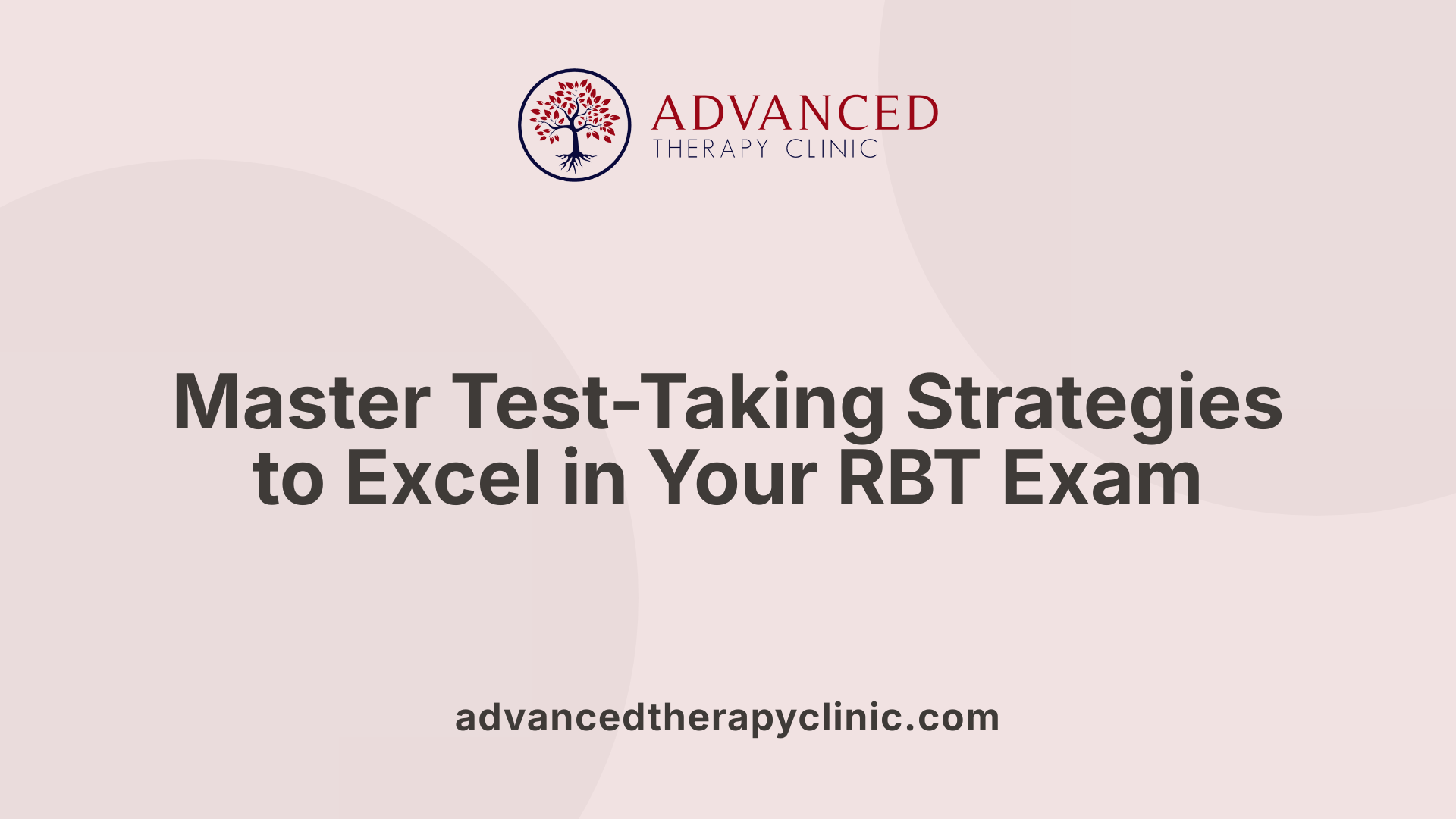RBT Exam Study Guide


Understanding the Path to Becoming a Registered Behavior Technician (RBT)
Aspiring professionals in therapy-related fields often look to the Registered Behavior Technician (RBT) credential as a pivotal step in their career development. This guide provides a comprehensive overview of the RBT exam, emphasizing the core competencies, exam format, and strategic preparation methods essential for success. Whether you're new to Applied Behavior Analysis (ABA) or seeking to solidify your expertise, understanding the exam's requirements and structure is a critical first step.
Exam Structure and Core Content Domains
What is the format of the RBT exam and what are the main topics it covers?
The Registered Behavior Technician (RBT) exam is composed of 75 multiple-choice questions that must be answered within a 90-minute time frame. Candidates are required to earn a minimum score of 80% to pass the exam.
Exam format and duration
- Number of questions: 75
- Time allowed: 90 minutes
- Passing score: At least 80%
Key domains covered in the exam
The exam content is structured around six essential domains aligned closely with the Behavior Analyst Certification Board (BACB) Task List:
- Measurement: Understanding data collection and recording methods.
- Assessment: Conducting functional behavior assessments.
- Skill Acquisition: Teaching procedures and promoting skill development.
- Behavior Reduction: Strategies aimed at reducing problematic behaviors.
- Documentation and Reporting: Accurate data documentation and ethical reporting.
- Professional Conduct: Upholding professional and ethical standards in practice.
The exam’s alignment with the BACB Task List ensures that candidates demonstrate competency in both the theoretical understanding and practical application of behavior analysis principles. Mastery of these core domains is essential to successfully obtaining the RBT credential, which serves as a foundational certification for professionals working directly with individuals with autism and related behavioral needs.
Training and Competency Requirements Prior to Exam Eligibility
What are the training and competency prerequisites before taking the RBT exam?
Candidates aspiring to take the Registered Behavior Technician (RBT) exam must first complete a comprehensive 40-hour training program. This mandatory program focuses intensively on Applied Behavior Analysis (ABA) principles as well as specialized intervention strategies for autism, equipping candidates with essential knowledge and practical approaches vital for their role.
After finishing the training, candidates must successfully clear an initial competency assessment. This assessment is carefully supervised by a Board Certified Behavior Analyst (BCBA), who evaluates the candidate's grasp of fundamental skills required to perform effectively in the field.
This two-step prerequisite ensures that RBT exam candidates have both theoretical understanding and observationally verified capabilities before sitting for the exam. Meeting these requirements not only aligns with the standards set by the Behavior Analyst Certification Board (BACB) but also supports quality and safety in behavioral health services.
Mastering Key Knowledge Areas for Exam Success
Which core knowledge areas are essential for passing the RBT exam?
Success in the RBT exam depends on a strong understanding of several core knowledge domains. These include data collection methods that ensure accurate measurement of behavior, which is critical for effective interventions. Candidates must also master functional behavior assessments that help identify reasons behind behaviors.
Teaching procedures form another vital area, focusing on skill acquisition techniques designed to promote learning and development. Additionally, behavior reduction strategies are essential for safely and ethically decreasing harmful or disruptive behaviors.
Ethical standards and professional conduct are equally important, guiding the responsibilities and scope of practice of a registered behavior technician. Understanding these standards supports compliance with industry expectations and the Behavior Analyst Certification Board (BACB) guidelines.
Focusing on these domains—data collection, functional assessments, teaching strategies, behavior reduction, and ethics—prepares candidates to meet the rigorous knowledge demands of the RBT exam and contribute effectively in their professional roles.
Utilizing Official Materials and Practice Resources

How can candidates best prepare using study materials for the RBT exam?
Candidates aiming for success on the RBT exam should prioritize using official BACB materials. These resources include the RBT Task List, which outlines the core areas covered by the exam, and detailed study guides that explain each domain comprehensively. The Task List serves as a roadmap, helping candidates focus their study efforts on essential topics such as behavior measurement, skill acquisition, and professional conduct.
Access to practice tests and study guides plays a vital role in exam preparation. Practice tests simulate the actual exam experience, allowing candidates to become familiar with the multiple-choice format and timing constraints. This exposure helps test-takers identify strengths and areas needing improvement, ultimately boosting confidence.
Structured study approaches are highly beneficial. Developing a consistent study schedule that breaks down the material into manageable sections facilitates deeper understanding and retention. Combining reading, note-taking, and engaging with practice questions ensures well-rounded preparation. Such an organized plan reduces exam anxiety and maximizes efficiency.
By blending official BACB content with practice resources and a disciplined study routine, candidates can enhance their readiness significantly, giving them a strong foundation to achieve the required 80% passing score on the 75-question, 90-minute exam.
Effective Test-Taking Strategies for the RBT Exam

How can time management improve performance during the RBT exam?
Managing the 90-minute time limit effectively is crucial when answering the 75 multiple-choice questions. Candidates should pace themselves to spend about 1 to 1.5 minutes per question. This prevents rushing through later questions and ensures every item receives attention.
What role does question flagging play in exam strategy?
Strategic question flagging allows test-takers to mark challenging questions and return to them after completing easier ones. This prioritization helps maintain momentum and reduces the likelihood of skipping questions entirely.
Why is thorough pre-exam preparation essential?
Comprehensive preparation, including review of the BACB-aligned task list, studying official materials, and taking practice tests, builds confidence and reduces anxiety. This readiness supports clearer thinking and better focus during the exam.
Together, mastering time management, leveraging question flagging, and engaging in diligent pre-exam study form an integrated approach that enhances overall performance on the RBT exam.
The Role and Importance of the RBT Credential

Why is obtaining the RBT credential important?
The Registered Behavior Technician (RBT) credential is a crucial qualification for those entering the behavioral health field. Granted by the Behavior Analyst Certification Board (BACB), this certification assures both families and employers that the technician possesses the necessary competencies to deliver effective Applied Behavior Analysis (ABA) interventions.
Significance for behavioral health professionals
For professionals, earning the RBT credential opens doors to numerous employment opportunities. It confirms their trained ability to assist in behavior measurement, skill acquisition, behavior reduction, documentation, and upholding professional conduct. This validation elevates their reliability in clinical settings and can boost career advancement.
Value for families seeking intervention services
Families looking for qualified intervention providers can trust RBT-certified technicians to deliver evidence-based ABA services safely and ethically. The credential signals adherence to rigorous standards, giving families confidence in the quality of care their loved ones will receive.
Credentialing authority by the BACB
The BACB oversees the RBT certification process, including the 40-hour training requirement and a competency assessment supervised by a Board Certified Behavior Analyst (BCBA). Their standardized exam covers essential domains and aligns with the BACB Task List, ensuring certified technicians meet industry-wide expectations.
Together, these factors underline the RBT credential's role as a specialized, recognized qualification that benefits professionals and families alike.
Developing a Structured Study Plan for the RBT Exam

What study plan approach is recommended for preparing for the RBT exam?
Preparing for the RBT exam requires a well-organized and structured study plan to cover all essential content areas effectively. Candidates should begin by thoroughly familiarizing themselves with the RBT Task List, which outlines the specific competencies related to behavior measurement, assessment, skill acquisition, behavior reduction, documentation, and professional conduct.
Incorporating study guides aligned with the RBT Task List provides a focused way to understand each domain in depth. Using practice exams and mock tests under timed conditions is highly beneficial, enabling candidates to identify strengths and areas needing further attention.
Balancing study time involves dividing hours across the six core domains, ensuring consistent coverage rather than heavy focus on a few topics. It's crucial to allocate time for review sessions and active recall exercises to consolidate learning.
Effective time management and setting realistic daily or weekly goals help maintain steady progress without burnout. This balanced approach not only improves knowledge retention but also builds confidence leading up to the exam day.
Key Takeaways for Excelling in the RBT Exam
Achieving successful certification as a Registered Behavior Technician requires not only meeting precise training and assessment prerequisites but also a thorough understanding of the exam's core content domains. Candidates benefit substantially from using official BACB resources, leveraging practice materials, and applying strategic study and test-taking techniques. Ultimately, earning the RBT credential opens doors to impactful career opportunities in behavioral health and ensures the delivery of quality intervention services.
References
Recent articles

Expressive Speech Delay 2-Year-Old
Understanding and Addressing Expressive Speech Delay in Toddlers

How Speech Recognition Works
Unlocking the Power of Speech Recognition in Therapy and Healthcare

Autism and Head Size
Understanding the Complex Relationship Between Autism and Head Size

Occupational Therapy in Autism
Enhancing Independence and Quality of Life Through Occupational Therapy in Autism

Do Autistic People Understand Sarcasm?
Navigating the Nuances: Understanding Sarcasm and Social Communication in Autism

Autism Routines
Crafting Effective Daily Structures for Children with Autism

